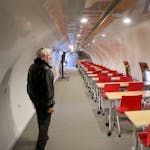To celebrate the 100th anniversary of the National Park Service, U.S. Secretary of the Interior Sally Jewell marveled at the wonders of Yellowstone National Park, the nation's first, and hiked the rugged wilderness at Glacier National Park, one of the most pristine.
Then she came to Minnesota to gush about a 72-mile stretch of the Mighty Mississippi — an urban national park site as much defined by the 3 million people on its doorstep as the scenery it frames and the wildlife that navigates its waters.
Jewell flew Friday morning from Yellowstone to the Twin Cities to paddle a portion of the river off St. Paul within the Mississippi National River and Recreation Area. The park became a featured stop on Jewell's national tour because it represents a natural treasure in the midst of a major metropolitan area.
"This is a state with incredible waterways," Jewell said, as she and a group of fellow nature lovers strapped on life jackets at the river's edge. U.S. Reps. Betty McCollum and Keith Ellison, and St. Paul Mayor Chris Coleman were part of the flotilla of canoes provided by the nonprofit Wilderness Inquiry.
"We are in a big city. It doesn't feel like a big city," Jewell added before climbing into a canoe launched at Hidden Falls Regional Park in St. Paul. "This is nature close to home."
Attracting new park users — especially city dwellers and people of color, who tend to use parks less often than others — is critical to the National Park Service's success in the next century, said John Anfinson, superintendent of the Mississippi recreation area.
"We need to get an urban and diverse audience," he said. "This is a safe and good place for all people to come."
To expound on that message, Jewell on Friday invited along members of the nonprofit group Outdoor Afro, whose mission is to encourage African-Americans to connect with nature. She was accompanied by national founder Rue Mapp of Oakland, Calif., and local group members.
Greg Schuck of St. Paul is a local Outdoor Afro organizer who joined Friday's adventure. He grew up camping, fishing, snow skiing, rock climbing and hunting, and even took his wife on a backpacking trip in the Rockies for their honeymoon. Now he is introducing his three children and other people of color to the wonders of nature.
"I am often the only person of color when I do a lot of these things," Schuck said.
Easy access to beautiful places like the Mississippi River, along with an invitation from parks staff and groups like Outdoor Afro, are what it will take to get more minorities out in the wild, he said.
"It's about making an introduction," Schuck said.
While Yellowstone was proclaimed the nation's first national park in 1872, the National Park Service was created 44 years later — on Aug. 25, 1916 — by President Woodrow Wilson to protect about three dozen national parks and monuments.
The Park Service now encompasses more than 400 different national parks, monuments, historic sites, recreation areas and battlefields, totaling 84 million acres.
Greg Lais, founder of Wilderness Inquiry, who paddled stern in Jewell's canoe Friday, said he believes the Park Service's commitment to greater access for all is a step in the right direction. His nonprofit puts 15,000 Minnesotans, most of them school kids, on the water each year. During cold-weather months, they haul their canoes across the country to offer an outdoor adventure to thousands more in places like New York and Washington, D.C.
A theme of the National Park Service centennial celebration is "America's Best Idea," and Lais agrees.
"I do believe this is America's best idea," he said. "Our job is to connect all Americans to this and to make sure it's a democratic experience."
Shannon Prather • 612-673-4804




